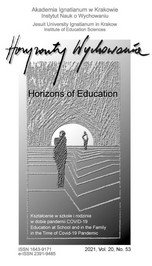E-learning Courses Satisfaction in Higher Education from Participants’ Perspective
E-learning Courses Satisfaction in Higher Education from Participants’ Perspective
Author(s): Dariusz PutSubject(s): Higher Education , Evaluation research, Distance learning / e-learning, Pedagogy
Published by: Uniwersytet Ignatianum w Krakowie
Keywords: e-learning; course evaluation; distance learning;
Summary/Abstract: RESEARCH OBJECTIVE: The aim of this paper is to evaluate usefulness of distance learning courses as a form of learning from participants’ perspective. THE RESEARCH PROBLEM AND METHODS: To achieve the purpose, two research methods have been employed: literature review, including rules and regulations concerning distance learning courses, and analysis of the results of a survey conducted among students participating in distance learning course as well as own observations and experiences. THE PROCESS OF ARGUMENTATION: In the paper it is analysed, how students perceive elearning courses comparing to traditional ones. First, selected Polish Minister of Higher Education and the Senate of Cracow University of Economics (CUE) regulations under which CUE teachers may conduct distance learning courses are presented. Second, the procedure for the preparation of elearning courses at CUE is described. The roles played by individual actors during the preparation of the course are discussed. Next, selected results of the survey conducted among course participants are presented. Finally, conclusions and observations are discussed. Results of the survey confirm that e-learning is a promising type of teaching supporting traditional lessons. RESEARCH RESULTS: A considerable number of participants found this kind of didactic process useful and attractive. However, an unexpectedly large number stated that they expected more traditional lessons. CONCLUSIONS, INNOVATIONS, AND RECOMMENDATIONS: The analysis allows to draw interesting conclusions concerning the necessity of selection of participants, problem of systematic work, methods of evaluation, personal contact with a teacher, preparation of teaching materials. All of them will be taken under consideration to improve the course for future participants.
Journal: Horyzonty Wychowania
- Issue Year: 19/2020
- Issue No: 51
- Page Range: 23-32
- Page Count: 10
- Language: English

